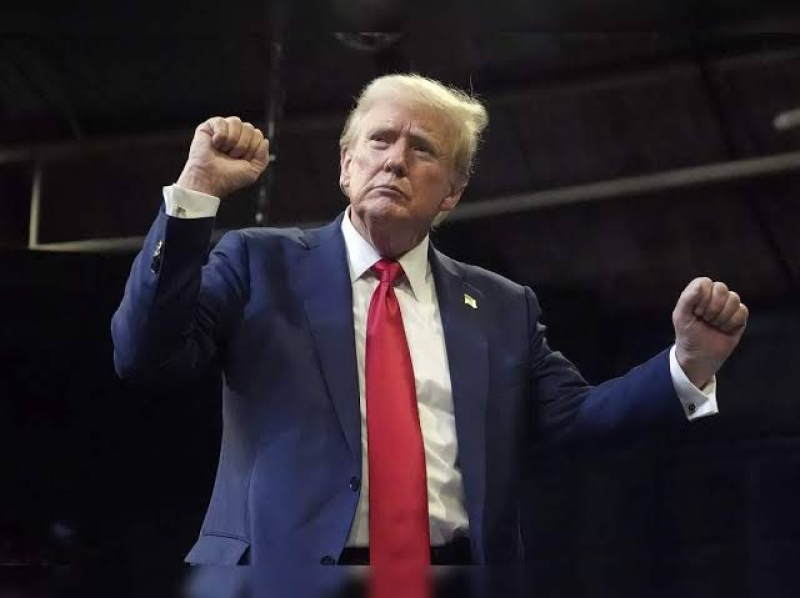- Western Support for Israel Faces Growing Strains |
- Nepal lifts social media ban after 19 killed in protests |
- DU VC vows maximum transparency in Tuesday's DUCSU elections |
- UN Pledges Support After Deadly Nepal Protests |
- 19 dead in Nepal as Gen Z protests at graft, social media ban |
Saudi Arabia Weighs Risks of a Trump Presidency

Donald Trump
As Donald Trump’s potential re-election looms, Saudi Arabia's de facto ruler, Crown Prince Mohammed bin Salman, faces a complex landscape. While he can anticipate warm personal ties with a Trump administration, the unpredictable nature of the former president poses significant risks to the kingdom's strategic interests.
With ongoing turmoil in the Middle East and a prospective "mega-deal" involving Israel's recognition still at stake, analysts suggest that the crown prince is acutely aware of how Trump's whims could disrupt his carefully laid plans.
Following a difficult start with President Joe Biden, the 39-year-old prince has established a working relationship with Vice President Kamala Harris, should she take the reins after the November election. "Broadly speaking, the Saudis would prefer a Trump victory," noted Dina Esfandiary from the International Crisis Group. "On the surface, he may be more supportive, but they are wary of his unpredictable actions."
During his 2017 visit to Riyadh, Trump was warmly welcomed, participating in a traditional sword dance and a military flyover. However, relations soured after the 2019 attack on Saudi oil facilities attributed to Iran, which the crown prince believed Trump failed to address forcefully enough.
Biden's approach shifted dramatically from his initial stance of isolating Saudi Arabia, as he sought to engage the kingdom in exchange for its support in recognizing Israel. Although the ongoing Gaza conflict has stalled this deal, it has led analysts to conclude that the Saudis are now comfortable with either a Trump or Biden-Harris administration, according to Ali Shihabi, a Saudi analyst close to the government.
"They enjoy a strong relationship with Trump and have also built an excellent rapport with the current administration, which they believe will remain stable with Kamala Harris," Shihabi stated. "It’s rare for them to feel equally at ease with both parties."
- Biden's Shift in Strategy -
The geopolitical landscape has shifted significantly since Russia's invasion of Ukraine, which has reinforced Saudi Arabia’s role as a key player and the world's leading oil exporter. In July 2022, Biden's controversial visit to Saudi Arabia, marked by a fist-bump with Prince Mohammed, highlighted a newfound willingness to engage, despite earlier condemnation related to the murder of journalist Jamal Khashoggi.
Both administrations have recognized the importance of Saudi cooperation in discussions around a potential Israel recognition deal in exchange for a defense pact and civilian nuclear assistance from the U.S. This shift underscores a bipartisan readiness to collaborate with the kingdom, as observed by Aziz Alghashian of the Observer Research Foundation. "Biden's evolution from an anti-Saudi stance demonstrates this commitment," he remarked.
- Challenges Under Trump -
However, Saudi Arabia's relationship with Iran may complicate matters should Trump return to office. In March 2023, the kingdom, aided by Chinese diplomacy, restored ties with Tehran after years of conflict. Trump's hardline approach towards Iran, marked by his withdrawal from the 2015 nuclear deal and the assassination of Qassem Soleimani, raises concerns for Saudi strategists. "A Trump presidency could complicate the delicate balance they’ve recently achieved with Iran," Alghashian cautioned.
Despite these potential pitfalls, the bond between Saudi Arabia and Trump’s camp remains strong as the election approaches. Key figures from the Trump administration have been actively participating in high-profile investment forums in Riyadh, and the Trump Organization has expanded its footprint in the Gulf, recently announcing a partnership for a high-rise project in Jeddah.
Jared Kushner's acceptance of significant Saudi investment for his private equity firm further underscores the intertwining of business and politics in this relationship. Kristin Diwan from the Arab Gulf States Institute highlighted the ethical implications of such ties: "Trump’s connections mirror the familial and public-private interests seen among Gulf monarchs."
As the election nears, Saudi Arabia finds itself at a crossroads, weighing the benefits of strong ties with Trump against the unpredictable consequences of his potential return to power.

